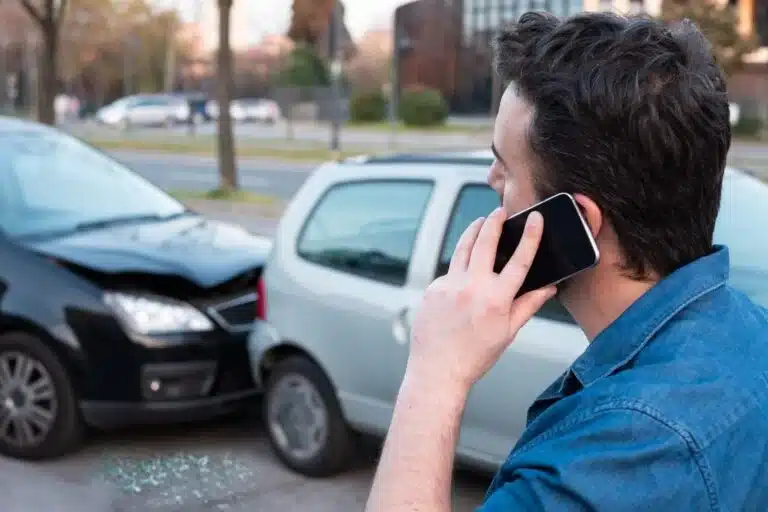
This is why you must speak with a car accident lawyer in Atlanta immediately after an accident. Attorney Ali Award knows all the strategies big insurance companies use to avoid paying your claim, and he has the knowledge and experience to fight for your legal rights to compensation. In just a few short years, he grew the CEO Lawyer Personal Injury Law Firm into one of the fastest-growing firms in the country. If you’ve been in an accident, don’t hesitate to call the injury accident attorneys at the CEO Lawyer Personal Injury Law Firm for a free consultation. There’s no obligation, and if we take your case, you won’t owe us anything until we win.
Fault and Car Accident Laws in the State of Georgia
You may have heard of “no fault” states like Florida or New York, where each driver’s insurance covers the damages in an accident, regardless of fault. Most of these states require Personal Injury Protection insurance, so you can get coverage for your medical bills if you’re hurt in a car crash. This system has benefits, such as reducing the strain on the court system and ensuring that insurance claims are paid relatively quickly, with no need to argue about who caused the crash. However, it also has downsides. Once you reach your insurance limits, you may be out of luck if you have more bills. There are a few circumstances where an injured party can sue the other driver, but these are limited and not an option in most cases.
Georgia is an at-fault state where the driver’s insurance will take care of damages in an accident. This can get complicated because it’s a comparative negligence state. Most states use this system, recognizing that fault doesn’t belong to one driver. There are many crashes where both drivers made errors that contributed to the collision.
How Does Comparative Negligence Work?
With comparative negligence statutes, a person can collect damages from the other driver (or, in most cases, their insurance carrier) if the other driver was more than 50 percent at fault. A driver who is more than 50 percent responsible can’t collect damages from the other party. If you are at fault for some percentage between 0 and 50, you will be able to receive compensation, but your total award will be reduced by the percentage you were responsible for. So if you were 15 percent at fault, you would lose 15 percent of the total compensation you were due.
As we mentioned earlier, insurance companies often spend a great deal of time trying to prove the other driver is at fault. If you were more than 50 percent responsible, they pay nothing, and their client gets their damages covered by your insurance. If you were less than 50 percent at fault, they would have to pay, but not as much. There is no downside to the other driver’s insurance company trying to blame you.
Of course, there is a difference between the insurance adjuster saying you were at fault and proving it in court. If your case goes to trial and a jury finds you were less than 50 percent at fault, they still have to pay. But guess what? Most personal injury cases settle out of court. Sometimes, the insurance only has to convince one person that you’re at fault – you. This may seem hard to believe, but we’ve met people who thought an accident was their fault because of something an insurance adjuster said, and they were mistaken. Or the insurer may have convinced them that the accident was mostly their fault when they only contributed by a small percentage.
This is why we recommend talking to an experienced car accident attorney before chatting with the insurance company. A free consultation won’t cost you anything and may save you from losing out on money the other driver’s insurance company rightfully owes you. If the insurance company calls before you have a chance to consult a lawyer, remember that you don’t have to talk to them right away.
What Is No-Fault Insurance?
No fault insurance is available in some at-fault states that do not require it, and it allows drivers to have coverage regardless of who caused an accident. This specific type of insurance is not available in Georgia, but there are other insurance options to cover some of the same things that no-fault insurance does:
- Medical Payments Coverage, or MedPay. This will cover your medical expenses if the other driver or their insurer disputes their fault, and in most cases, even if you were at fault. It’s also helpful if the other driver was uninsured/underinsured (in some cases, you may use both kinds of coverage). This type of insurance is available to Georgia drivers but is not required, so don’t assume you have it. If you don’t remember buying it, check your policy or talk to your insurance agent.
- Collision coverage. Your standard liability coverage will pay for damage caused to another driver’s vehicle if you are at fault, but this does not cover your own vehicle. Unfortunately, many people don’t realize this until they seek compensation for their vehicle damage. Collision coverage will pay for damage to your car, but it is not required in Georgia, like med pay. Be sure to check your policy to see if you have it.
If you or a loved one have been hurt in a car accident and need help figuring out how to cover your related expenses, please contact the CEO Lawyer Personal Injury Law Firm for a free consultation. We’ll consider every option for getting your damages paid, explain the choices you have, and answer your questions. There is no time to lose, so please contact us as soon as possible.



